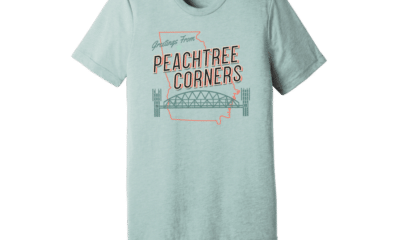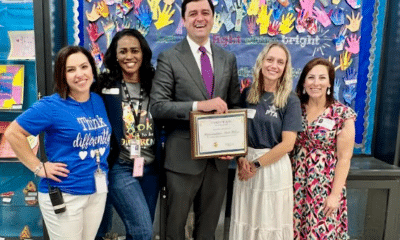Business
Finding Growth and Success in Artisanal Firewood, through Mistakes, Testing, and Creating their Core Values [podcast]
Published
3 years agoon
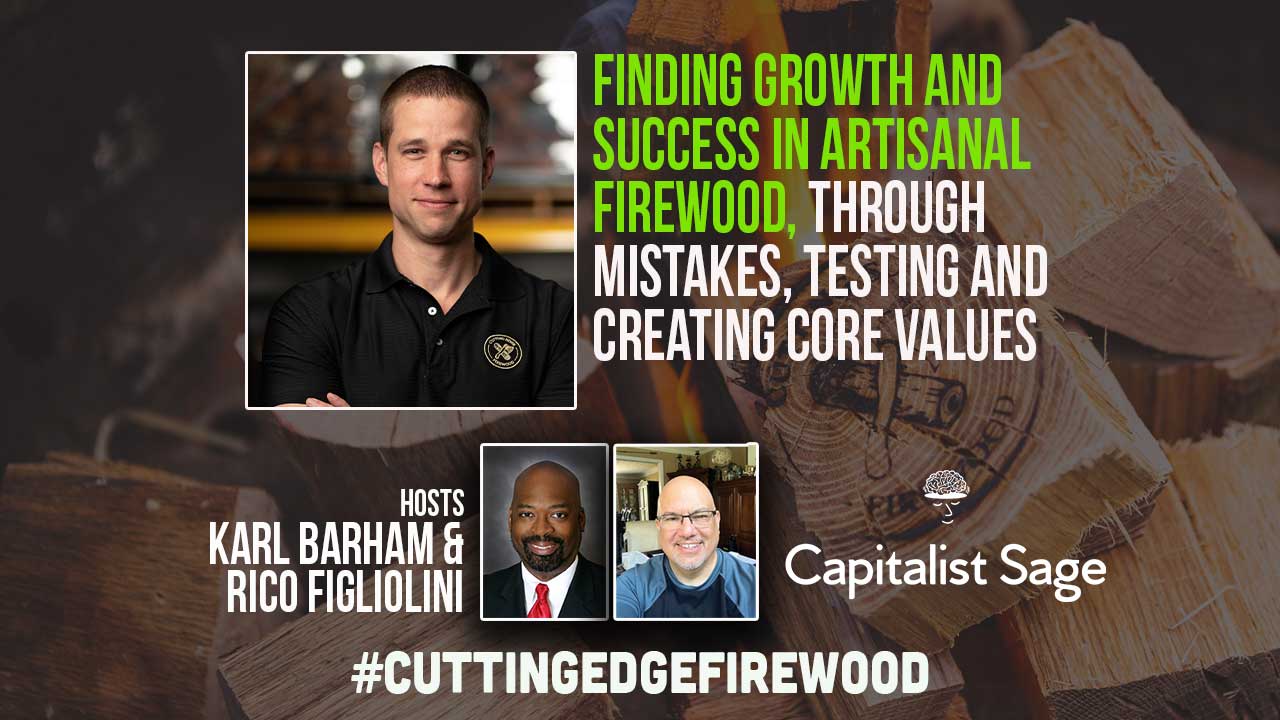
Firewood may not be the first thing you think of when talking about new and exciting business ventures. But Leroy Hite, founder, and CEO of Cutting Edge Firewood saw this industry as an interesting and challenging way to provide quality service and products to customers. Join Karl and Rico as they talk with Leroy about his experience growing and maintaining a high level of service quality in the business of artisanal firewood.
Resources:
Cutting Edge Firewood Website: https://www.cuttingedgefirewood.com

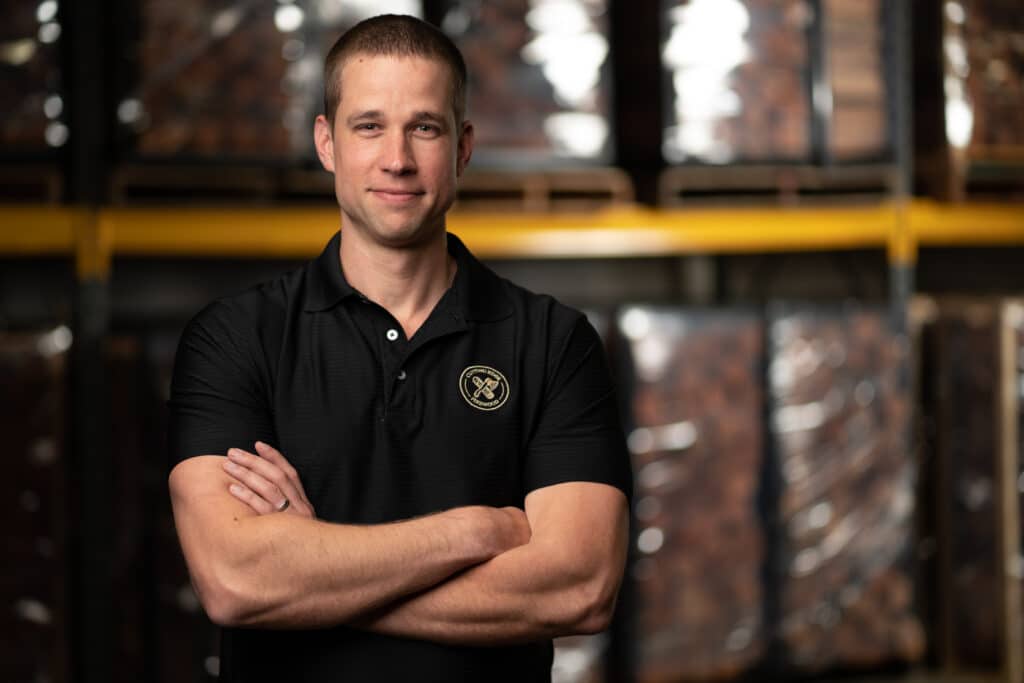
Timestamp:
[00:00:30] – Intro
[00:01:36] – About Leroy and Cutting Edge Firewood
[00:05:32] – Why Leroy Chose The Firewood Industry
[00:08:41] – Implementing Ideas and Working Through Challenges
[00:11:42] – How Success is Measured
[00:14:01] – Scaling the Business
[00:16:16] – Areas of Growth and New Strategies
[00:17:36] – Maintaining High Quality Service
[00:21:56] – Holiday Seasons in the Firewood Business
[00:23:32] – Using the Cooking Wood
[00:26:11] – Closing
“We have a set of core values that we really drive home. And we say the most important one is the customer experience. Every single person in the company strongly affects the customer experience. If a customer calls in and they have a bad experience, it’ll ruin the whole thing. If a delivery artisan goes out, who’s the face of the company and is rude, that messes up everything. And so that is one of our unifying core values is that everybody is driving the customer experience.”
Leroy Hite
Podcast transcript
[00:00:30] Karl: Welcome to the Capitalist Sage Podcast. We’re here to bring you advice and tips from seasoned pros and experts to help you improve your business. I’m Karl Barham with Transworld Business Advisors, and my cohost is Rico Figliolini with Mighty Rockets, Digital Marketing, and the publisher of the Peachtree Corners Magazine. Hey Rico, how are you doing today?
[00:00:48] Rico: Good, Karl. Good to be here. I can’t wait to talk to our latest guest.
[00:00:53] Karl: Absolutely. Yeah, it’s going to be exciting to talk with another brilliant young entrepreneur that’s here, local. But why don’t you tell us a little bit about the sponsors for today Rico?
[00:01:02] Rico: Sure. So Peachtree Corners Magazine is a sponsor of this episode, as well as the family of podcasts that we do. And you can find out more information about the latest issue at LivingInPeachtreeCorners.com.
[00:01:15] Karl: Excellent. Today our guest is Leroy Hite. He’s the founder and CEO of Cutting Edge Firewood and a local small business owner who provides premium firewood to their customers. Hey Leroy, how’re you doing today?
[00:01:31] Leroy: I am doing fantastic. Thank you very much, gentlemen, for having me on the podcast.
[00:01:36] Karl: Oh, absolutely. We’ve got so many great things happening here in Georgia and locally here in Metro Atlanta and Peachtree Corners. Not only do we have technology companies growing, we have large corporations moving into Peachtree Corners and the surrounding areas. We have entrepreneurs like yourself that are just innovating on industries and doing some really fun things. Why don’t you tell us a little bit about yourself and about your company? What do you guys do?
[00:02:04] Leroy: Yeah, absolutely. So first I’ll give kind of like the vision for the business and that’ll play in with the products. So back in 2013 started the business. Long story, but with the vision of both cooking wood and firewood. A fire is like a beautiful sunset. It’s universal. It’s primal. And it’s unifying. There’s literally no one on planet earth that doesn’t enjoy a wonderful fire. Whether you have a 95 year old man from Ethiopia or a three-year-old girl from Georgia, they will sit in front of a fire and enjoy it. After a stressful day, I can take a glass of just a shot of whiskey and sip it for a couple hours in front of a fire, and it’s amazing how much less stress I have afterwards than when I started. My wife can come out and it’s romantic. We can have our three daughters out for smores and they love it. And they create memories that they remember for the rest of their lives. Teenagers will put their phones down and talk to their parents. I can have a few of my buddies over and we talk about deep things that guys don’t usually talk about. And it can be at the center of a wedding party and I can cook amazing food over wood to the point that I don’t even really like going out to fancy restaurants because I can cook it better at home. And so you have that on one side and then on the other side, before we got in the industry, the industry standard was wood would set outside on the ground for 12 months, rot and literally have mushrooms growing out of it. And the business strategy, the branding, and the customer service matched the product quality. And so that’s what really drew me into it. That, and the fact that it’s an experience. And I love offering others wonderful experiences. That’s what drives me. And so what we offer is the firewood, of course. We have boxes that we, in Metro Atlanta, and Metro Nashville, Dallas, and Seattle currently. We offer same day delivery for the boxes of firewood. The boxes come with enough for two to four fantastic fireside experiences. And they come with kindling, fire starters, and a box of matches. We also ship those around the country. And then we have our patented airbrush metal racks that we offer in our delivery artisan areas. And those areas are Metro Atlanta, Chattanooga, Greenville, South Carolina, Charlotte, and Nashville. With those, our delivery artisans bring the rack to your home. And all of our firewood goes through a special process that makes it bug free, burn hotter, longer, start easier. And so we will put that rack essentially anywhere that you want it. And then when you reorder, we take the empty rack and replace it with the full one. And then we do cooking wood that we ship around the country for all different ways of cooking over wood. Whether it’s a pizza oven or a big green egg, you can use our chunks or splits in a bunch of other different smokers and grills. So that’s the quick, yes sir.
[00:05:11] Rico: I just got a delivery of that by the way. And I’ve got to say, I haven’t burned the wood yet, but just the smell of it. Just the scent of that wood. I forget which two that I got, but they’re two different flavors, if you will. Just unbelievable to be able to just be in the room, just smelling that wood before it even gets burned.
[00:05:30] Leroy: I appreciate it.
[00:05:32] Karl: Yeah. So I’m curious, you went into an industry and I love that you picked firewood because if you were to think of a commodity that anything could be, nobody gives a lot of thought if they walk into whether it’s a Home Depot or somewhere else, to buy firewood what brand it is, who it is, and so on. What made you pick this industry and firewood in particular to focus on and what are some of the key elements of your strategy to differentiate it?
[00:06:02] Leroy: It’s a great question. So, I love the experience aspect of it, and I love that it’s something that nobody else has really treated it like a business. Much less a modern business with a lot of opportunity. And that’s what drew me into it is the experience aspect. And that, in business, if you see everyone going in the same direction, a lot of times the opportunity is going the opposite direction. So that really got me initially interested, I knew that there was something here. And what’s really differentiated us is that, the devil’s in the details is a great saying. And that there’s a lot of truth in it. From the beginning to the end, we pay attention to every detail. I wanted to shock people that a firewood company would have branding as good as ours. When they order on our website, we want that to go smoothly and be a great experience. When you call in and talk to somebody, you talk to somebody that’s very professional, very knowledgeable. All of our employees are wonderful and go through a lot of training and love taking care of customers. And then when the package arrives, whether it’s a delivery artisan delivering it, you’re blown away with how we do it. And then you actually use the product and that sets us apart because you don’t have wood that’s just sizzling or that’s bug infested. Or if you’re cooking over it, you’re not cooking over something that has mold and mildew. Every single product that we put out, kind of an internal saying is we have a lot of famous people. For example, Terry Bradshaw is a really good customer, to name one that’s publicly endorsed us. And so we treat every single customer like they’re Terry Bradshaw. So when Terry Bradshaw orders, we don’t pick out specially wood just for Terry Bradshaw, I don’t go and make sure that everything’s perfect. He’s treated like every other customer, which is like Terry Bradshaw, if that makes sense. And then we actually write a handwritten note to every customer thanking them for their purchase. Which of course is something that sets us apart from almost anybody in any industry. And that’s another thing is really when people order from us initially their standards are really low, but our goal is to just blow their standards out of the water and set ourselves a high bar to follow through the second time that they order. So we don’t want to rest on our laurels and be happy with the low standards. So really we want to be innovative and offer a phenomenal experience and have phenomenal customer service, not just for firewood but for any industry.
[00:08:41] Karl: Oh, I love it. Some of the things you’re doing seems pretty obvious that people should do in their business. And people could, may have a different perception of what great looks like or what good looks like in there. What are some of the things that you were trying to implement to get to where you are today or things you didn’t expect to happen? What were more challenging to do then than you might’ve first thought?
[00:09:04] Leroy: Oh, everything. So that’s the other side of traveling the path less traveled. Making your own trail. Whatever you want to, however you want to put it is, everything that we do because we’re innovative we kind of have to learn things the hard way. So we’ll try something out and I’ll think it’s ingenious and we’ll fall flat on our face. And there’s been times where we’ve lost hundreds of thousands of dollars on trying something out because I thought it was going great and it wasn’t. So we’ve, yeah, we’ve gone into like trying to sell the different B2B markets. And I thought they were really great, innovative ideas and we pushed it really hard. And it just doesn’t work at all. And so we’ve really found that direct to consumer, B to C is our sweet spot.
[00:09:54] Rico: Yeah, what were you specifically trying to do? Was it white labeling B2B? What specifically was the point?
[00:10:01] Leroy: Yeah, we actually did try to white label. And this is back in, I think 2015. Probably don’t have time for this podcast, but it’s pretty interesting long story with lots of risks, but one time back in 2015, we actually tried to sell some bundled firewood to stores and bought some equipment and it ended up actually being the warmest winter record. And so they couldn’t get rid of their one. But the more, the more recent example that’s from like 2019 is we did a big push to sell to restaurants. And in restaurants, the pricing is very competitive because restaurants’ margins, they don’t have a whole lot of margin. And so the idea was we would offer them the racks at competitive pricing, but in exchange for us offering them a higher quality wood for competitive pricing, they would put the racks in their dining room. And so we wanted high-end restaurants to have the customers to see our racks and then help improve brand awareness. And basically as prices started going up, it started eating into our profits. And so it started costing us a lot of money and a lot of the restaurants wanted us to bend over backwards for them when we were losing money. And so we had to pull out of that, pull out of that, but it’s interesting. Cause at the same time we started putting out yard signs that year. And that’s when everybody started to know who we were because of the yard signs.
[00:11:34] Rico: You, weren’t afraid to innovate. You weren’t afraid to try things and pull back from it.
[00:11:40] Leroy: Yes, sir. Absolutely.
[00:11:42] Karl: There’s an interesting thing that you said in that story, as you were sharing that example that I think is a key point. You try stuff. And if you’re going to blaze a new path and innovate, you’ve got to try things and take risks. You were somehow able to know that it wasn’t getting the desired outcome and profitability. Tell me a little bit about how did you know, how do you measure success? You mentioned that you saw the profitability, what does it look like when you’re managing the bottom line of your business? So you know when to end a certain path so you can move in a different.
[00:12:20] Leroy: Measuring is super important. It’s funny because I most definitely learn more about that every year. I’m more of a, if you’ve ever read the book Rocket Fuel. It talks about integrators and visionaries. Definitely more of the visionary style. So I’m definitely less risk adverse and than some others. So I like pushing the envelope even when it comes back to bite me sometimes. But it’s extremely important to measure everything that’s important. So how we knew what was, and wasn’t working that year, it was just simply every time a customer would call in, we would ask them, how did they hear about us? And we would keep up with that in our CRM. And so generally, we just knew a percentage of where all of our new customers came from. We knew that we weren’t getting anywhere near as many new customers from the restaurants as we wanted. Whereas the yard signs were working phenomenally. Same thing. We tried putting up some billboards that same year and we weren’t getting the return. Now after the growth in 2020 and this year we’re going, our systems are becoming a lot more complex. And I brought on a really high level team that’s going to help us grow the business into the next area. And they are really good about measuring everything and sending me the information.
[00:13:40] Rico: I also noticed that you guys expanded just recently. I think it was in September. You went from 10,000 to 40,000 square feet in Peachtree Corners?
[00:13:49] Leroy: That’s correct. Yep, that’s correct. So our warehouse is looking pretty impressive. It’s a lot of fun actually, just to walk around there and I’m like, wow, this is crazy.
[00:14:01] Karl: Yeah. If you think about it though, you’re hitting on another key insight in learning along this journey is there’s a point of when, in order to scale, you’ve got to surround yourself and build a team. Where different people have different areas of expertise and specialty and let them do that very well. You are like many of the classic entrepreneurs who have vision and willing to take risks. And then there’s those often, they’ll find people to support them that are good in the details of the execution and the numbers. And that balance, it is sometime found in one person sometimes it’s found in many. The key thing for your business is that you figured out how to bring that together to help you continue to be successful and scale the business.
[00:14:45] Leroy: Yeah, it’s crazy. Cause looking back on it just, there’s so much trial and error and there’s many different ways that you can look at it as far as setting yourself apart. One of those though is just, as much as possible, the painful side is learning how to make that pain less painful each time you try out something new. So like an example in marketing is we tried out a company where we did an influencer campaign and we spent $40,000 on it in the spring. And I thought it was a really good idea. And we just got a fraction back in revenue that we spent on it. And so the answer is like, okay, we’re not doing that again. And so we learned our lesson and it hurt, but we learned our lesson. We now will go on to budget and we’ll go on to trying out the next thing within our budget. And hopefully the next thing works.
[00:15:37] Rico: Was it because the influencer campaign didn’t extend far enough that you didn’t get enough influences on it? Sometimes these things happen too.
[00:15:45] Leroy: I think it was the particular audience. So I guess to get more detailed, it was influencers that cooked over one, which you would think would be exactly who we need to get. But we have a very particular demographic within the cooking wood industry or world that we’re targeting. And so I think the people that we, the cooks, the chefs that we got, I don’t think they targeted enough of our particular audience.
[00:16:16] Karl: Got it. As you think into the future and growth, what white space areas out there or growth strategies do you think you’d like to explore next that you haven’t started to?
[00:16:30] Leroy: As the chief visionary, I spent a lot of time on that. Maybe too much time. So our delivery artisan service is, it’s very slow moving. It’s very capital intensive. Because we hire very high level employees to take care of our customers and we have to buy trucks and equipment and the metal racks up front. And of course the firewood. But it’s very, there’s not anything else out there in any industry that’s quite like it. So I think that’s something that’s going to continue to grow at a healthy level. But I do see our boxes of firewood, same day rapidly growing around the country and other cities along with us shipping our cooking wood. Whether it’s for the pizza ovens, or for Big Green Egg, or Kamado Joe ceramic grills, or other kinds of smokers. I think that kind of stuff is going to grow really quickly. And we’ll use that to continue to grow the delivery artisan service. And the great thing is they all work together really well. Because then we can move the delivery artisan service into the markets as quickly as we want to.
[00:17:36] Karl: I love that approach. I know I work with a lot of business folks that are looking to grow. And one of the options that they look is a franchise approach to doing it. Very successful. It’s exploded all over the world. Franchise growth and so on has its pros and has its cons. Of course, as an approach. One of the areas is around this service experience. When you grow organically yourself, you have better control over the service expectations, how you hire, how you recruit people in that. If you go through franchise, you hope that those owners, local owners will follow it, put things in place, the tools in place, but that can vary from group to group. What are some of the things that you’ve been successful at implementing, to drive this service-based culture that you’ve been able to create and drive as part of your brand?
[00:18:28] Leroy: Yeah, first and foremost is hiring the right people. And we have a set of core values that we really drive home. And it’s not just something we write up on the wall and point to once a year or twice a year. It’s something that essentially every meeting we drive home. It’s how we grade our people is against these core values. And we say the most important one is the customer experiences. Every single person in the company strongly affects the customer experience. If a customer calls in and they have a bad experience, it’ll ruin the whole thing. If a delivery artisan goes out, who’s the face of the company and is rude, that messes up everything. If somebody that is processing the firewood and going through it and sifting through it, making sure and quality control and they let wood that’s not up to par. That’ll definitely ruin the entire experience. And so everybody plays a part. And so that is one of our unifying core values is that everybody is driving the customer experience. And then the next is putting the procedures and processes in place. Which honestly is definitely one of my weaknesses, but why it’s very important to surround yourself with others that have strengths, where you have weaknesses. To put all these processes in place that protect against mistakes getting made.
[00:19:49] Karl: It’s very interesting around that service thing. It’s something that we strive to reinforce in our team and our business. We’re a service-based business as well. And you articulated, I think exactly, our three pillars. One is in the people. And we think of it in training and attitude. You could train people on skills, but attitude sometimes is kind of who the person is. So when we look to select team members, we’re looking for the right values and attitude that aligns with a drive toward the customer. Arming them with the skills to deliver good service value. How to respond to people, how to listen. The second one was around systems. You know, we put in systems, make a CRM, different tools to make people be able to deliver good service. We learn about our customers so when they call in, we know what they came in for. We can help each other across. But that third element that you started with, is the values piece. And when you think about values, we set goals to it and we measure it. We measure service, we measure individually how people performing the service and others. And I think that’s one of the things that a lot of small business owners don’t get around to focusing on as much. But you could start at any level getting the right people, putting in the right systems, and measuring the behaviors and outcomes that you want. That’s a good start, but you’ve got experts out there that can help you with exactly what to do in each one of those pieces. But you’ve landed in the same place.
[00:21:29] Leroy: Yes, sir. Yeah, exactly. Yeah, one of our other core values is team. Which is everybody working together as a team, having the right people, having the right team. And it’s funny cause having the right people is what makes, for me. A place to be is fun and fulfilling is having the right people. And everybody together going after the same goals. And it, yeah, no, that gets me excited.
[00:21:56] Karl: No, absolutely. I’m curious, we’re coming into the holiday seasons now. What is it like in your world during the holiday season? What type of stuff do you have coming up and do you especially focus on in this part of the year?
[00:22:10] Leroy: Yes. So this time of the year is definitely our busy season. This is our make it or break it part of the season. Of course we sell the cooking wood and we sell the firewood year round. And the cooking wood is less seasonal, and a lot of people cook outside in the spring. But everybody buys, both cooking wood, definitely the firewood peaks in October, November, and December. But people like the buy to cooking wood for gifts for the holidays. And so it all comes together right now. So we’re driving and pushing hard. I guess really the newest thing is just, we’re really pushing on the cooking wood, because it’s a newer thing for us. And just like the firewood, it’s just as big of a difference. And for me another thing is, I only like to do things that kind of really set us apart from anybody else. And that’s why we got into the cooking wood. It’s also something that we’re able to do better than anybody else.
[00:23:05] Rico: It’s probably also less seasonal too, I would imagine. I mean, if I’m out there cooking, even during the summer doing a Green Egg barbecue. Or there’s those new, there’s a Georgia company that manufactures them too, where it’s a metal grill, if you will. And the inside is where you burn the wood. This is kind of a great party type thing. Because you could put that meat all around and everyone stands there and cook their own.
[00:23:29] Leroy: Yeah. You’re probably talking about gather grills or the kudu girl. Yeah.
[00:23:32] Karl: For those of us that may not have the expertise in grilling and cooking with wood. Can you share with us just some of the examples of, I’m assuming any of this can’t be used in cooking in your kitchen? Or are there ways that you could utilize this wood? If you’re cooking indoors, first of all, And then second, outdoor cooking. If you’re really, if you have a gas grill versus other types. Do you have ways for people to bridge some of those gaps when they’re cooking?
[00:24:01] Leroy: Yeah, great question. Inside is a bit more difficult. You have to have a lot of specialized equipment to cook with it inside because you have to have something that draws out the smoke. We do have customers that have indoor equipment and ovens. Usually it’s like a pizza oven that they put even in their residence. But outside, so you can buy things. It’s just really just a little metal thing that will hold a chunk, or a couple of chunks, or a single split, in your gas grill to get that wood flavor. It really is pretty simple. It’s not that complicated. It’s funny, in March, I’ll have been married for 14 years. My wife and I first got married, I got a charcoal grill. Burned really bad, a couple of burgers and threw the grill away. And then, when we started getting into the cooking what I thought, you know, what? I probably should know what I’m talking about. So I brought a grill home and started experimenting with it. And people were giving me compliments within the first couple of weeks of cooking over wood. Because most people, it’s quickly growing in popularity, but it’s still at its infancy. And it’s amazing, good quality wood, how much flavor that adds to the food. And it’s not an exact science, it’s a little bit more of an art. And of course it takes practice. And then when you get down to the science after a couple of years, you do fine tune it. It takes a little bit of practice. And you can use charcoal in your grill and use that as a heat source. And then just right before you put the food on don’t soak the chunks or the splits, just put on a couple right before you put the food on, and then you cook it as usual. And it’ll add a lot of the wood flavor. Or you can get to where you master it and you cook with all wood. But it’s really not that complicated. And if you just play around with it you’ll have within a few cooks, you’ll be making food that’s enjoyable and you can taste. And it’s, really you look at it as just a different ingredient. Because it’s just a different flavor you can put into the food.
[00:25:59] Rico: That’s a Gather Grill, by the way, that we were talking about before.An example from your Facebook page, actually.
[00:26:05] Leroy: Yeah. So perfect. Yeah, with the Big Green Egg in the back.
[00:26:09] Rico: Yeah, there you go.
[00:26:11] Karl: One of the exciting things as we’re getting into the holiday season after this past 18 months, people have morphed outdoors. I remember last Thanksgiving many people hosting Thanksgiving feast outside in various forms. And of course your firewood would be a perfect addition for people to bring in not only for comfort, but also adding into how they cook. If someone wanted to reach you and find out more about your business and place an order for a gift or anything else, what’s the best way to reach you?
[00:26:41] Leroy: The best way is our website at CuttingEdgeFirewood.com. And if you want to reach out to me personally, LinkedIn is the best place to get connected.
[00:26:52] Karl: Okay, excellent. Do you do gift certificates or anything?
[00:26:56] Leroy: We do get certificates and then obviously a box of firewood is a phenomenal gift. And we do gift notes, whether it’s for a rack or for a box. And then if you’re wanting to give a gift to somebody for cooking wood. Of course if it’s for a pizza oven then get our pizza cut. But if they have a Big Green Egg, we have variety packs for the splits and the chunks. So there’s a lot of different options.
[00:27:20] Karl: Oh, excellent. I want to thank you, Leroy and re-introduce you to everybody that might be joining in later on. Leroy Hite is the founder and CEO of Cutting Edge Firewood, a local business. Where’s your, your warehouse location at?
[00:27:34] Leroy: Warehouse location is off of Peachtree Industrial Boulevard between Jimmy Carter and Winter’s Chapel. Real close to Jimmy Carter and it’s on Google maps. So you can just look up Cutting Edge Firewood.
[00:27:49] Karl: A local business here in Gwinnett county that is doing great things. Great example of blazing new trails. So I want to thank you for sharing some of your experience growing and developing this business to brand. And driving this really service element into what others might’ve seen as a commodity thing. And really building a real premium brand around that. So we will continue to wish you success in doing that. Thank you so much.
[00:28:16] Leroy: Thank you very much, gentlemen. I thoroughly enjoyed it.
[00:28:19] Karl: You’re welcome. I wanted to also introduce myself, Karl Barham with Transworld Business Advisors of Atlanta Peachtree. Our business advisors are available to consult with your business. Whether you’re looking to improve and grow it, whether you’re looking to exit one day, your business, you can contact and schedule a consultation. We do valuation, exit planning, and when people are ready, we help them find buyers for their business. You can also reach us at www.TWorld.com/AtlantaPeachtree. Rico, why don’t you tell us a little bit about the many things you do. And I know we’ve got another edition of Peachtree Corner Magazine coming up soon.
[00:28:58] Rico: Yes, that’ll be the December, January issue. We’re working with some really great stories on that where, I think one of the main features is how people celebrate the holiday season. So that’s one. The other one is about home-based businesses that are growing up in Peachtree Corners. People that are homemakers, if you will. Where they’re making products out of their basement or their home, and selling it on Etsy and online and festivals. So a couple of different good main features coming out and that’ll be the December, January issue. They can find the current issue though online at LivinginPeachtreeCorners.com. Beyond that I do content marketing, video production, photography. So if you’re looking for any of those services, you feel free to reach out to MightyRockets.com or check me out on LinkedIn. Rico Figliolini, F-I-G-L-I-O-L-I-N-I, you can’t miss me on LinkedIn. So check that out too.
[00:29:50] Karl: Absolutely. Well, thank you for everyone joining us and listening to the Capitalist Sage Podcast. And we’ll continue to bring you new episodes and just want to appreciate all the guests that have joined us. And today, Leroy for sharing some of his experience around growing business right here locally in the Peachtree Corners area. Thanks. Take care, everyone.
[00:30:12] Leroy: Thank you.
Related
Business
Peachtree Corners Grows Business Opportunities Through Economic Development
Published
5 days agoon
May 6, 2025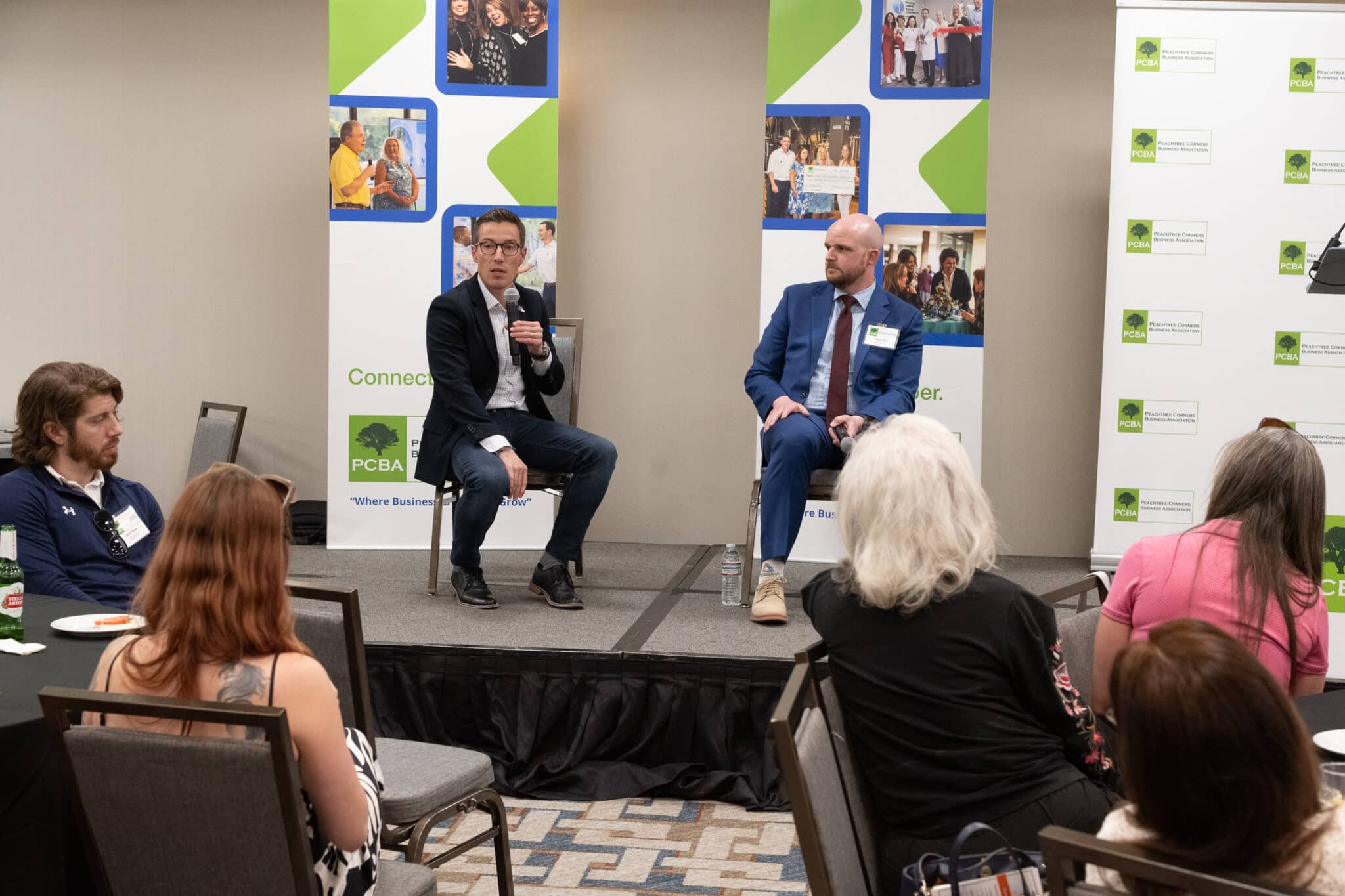
Most residents and business owners in Peachtree Corners probably think they know all about the economic development and strategic planning of Peachtree Corners, but do they really?
Peachtree Corners Business Association invited Peachtree Corners Economic Development Director Betrand Lapoire and Partnership Gwinnett Director of Economic Development Andrew Hickey to its After Hours Speaker Series on March 27 to discuss the city’s growth from a 1971 master plan to a bustling city with 42,000 inhabitants and 40,000 jobs.
Key points included the importance of business retention and expansion, with 24 projects last year creating 1,600 retained jobs, 1,600 new jobs and $250 million in new capital investment.
The Curiosity Lab, a world-class innovation center, was emphasized as a significant attraction. The city’s zoning and infrastructure plans were also discussed, focusing on balancing office and residential development to maintain a vibrant, sustainable community.
Matching jobs to residents
Although Peachtree Corners is just a teenager in terms of being an incorporated city, the foundation for this vibrant, fast-paced economic hub was laid more than 50 years ago by technology pioneer Paul Duke.
“Peachtree Corners was the first master-planned, business innovation technology park in metro Atlanta,” said Lapoire. “It was in response to the brain drain of technology with Georgia Tech graduates leaving the area.”
While the city may have a small-town feel, it’s the largest in Gwinnett County by population, but not land mass, he added.
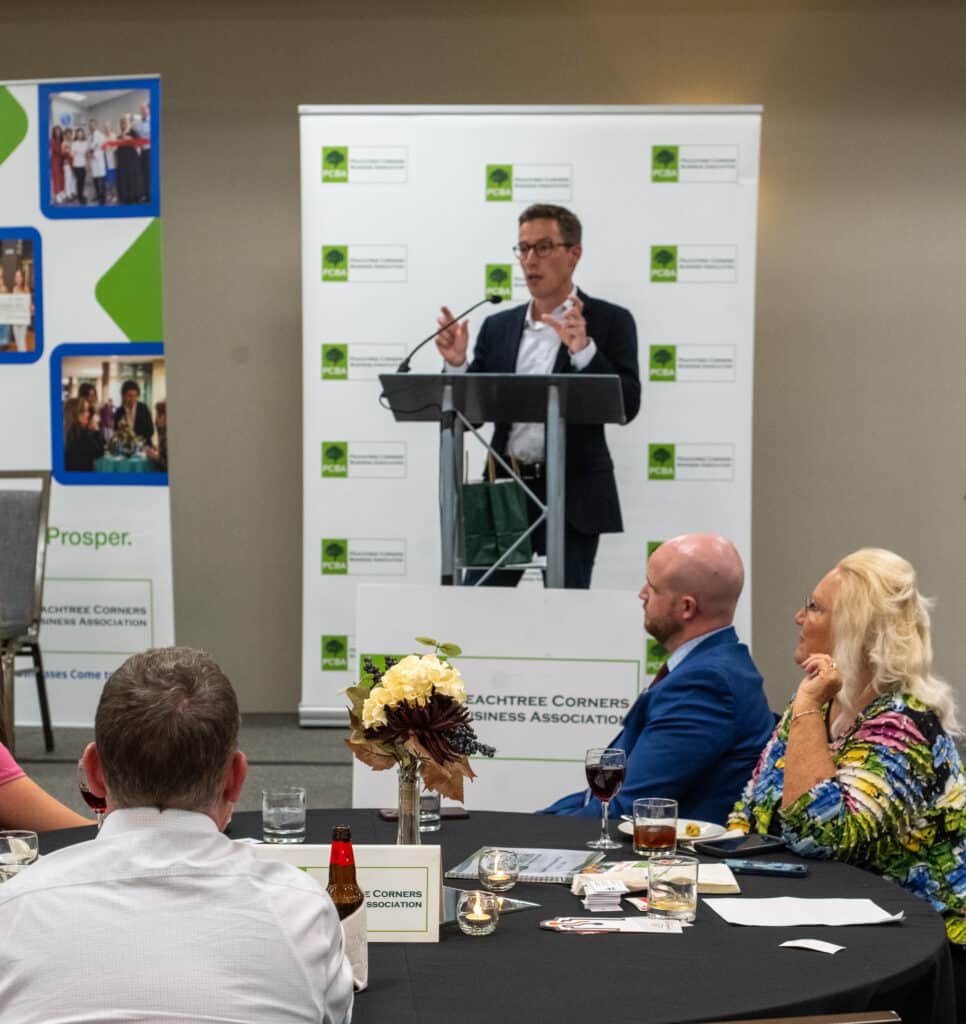
“The city started from a commercial, industrial, R&D base and then was expanded around it,” said Lapoire.
Though home to more than 42,000 residents, most of the jobs in Peachtree Corners are filled by people who live outside the city, he added.
“So we have this interesting mismatch, in a way, although not unusual,” said LaPoire. That creates traffic and transit issues. So that means that one of the solutions is to create more jobs here to fit the profile of the community.”
He presented charts that show professional services, consulting and engineering as the largest job categories. The next tier of businesses are wholesale and manufacturing.
“So we have a good mix of industry,” he said.
A five-year plan
The city has a five-year economic development plan (2023-2028) that outlines strategies for attracting and retaining businesses, with education and workforce development being key components.
Partnership Gwinnett has similar goals as Peachtree Corners, but on a larger scale.
“We are the county’s sales and marketing arm for all 17 cities now, and we receive funding from both municipal sources as well as existing businesses here — both in Gwinnett and outside of Gwinnett as well,” said Hickey.
He shared how Partnership Gwinnett is designed to drive a lot of major corporations toward doing business inside and with Gwinnett County.
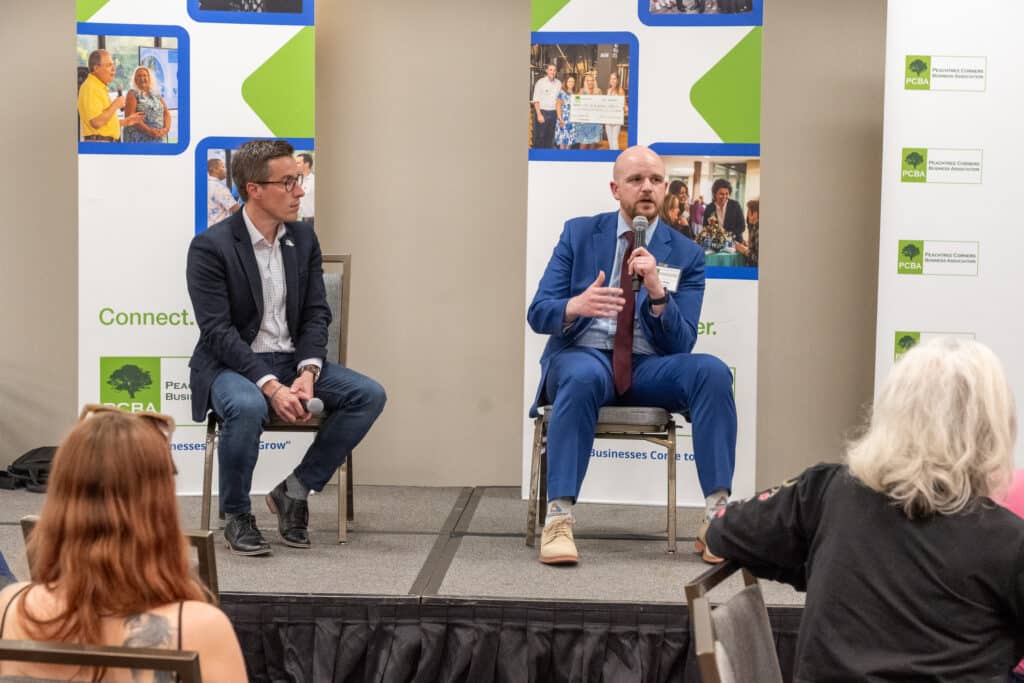
“One of the biggest things that we talk about that I’m sure it seems like most of us here, if you live here, you work here, you understand it. It’s the diversity that exists here in Gwinnett,” he said. “With a diversity index of 85, that means if we walk out of the Hilton here and we say hello to somebody, there’s an 85% chance they’re from a different ethnic or cultural background than ourselves, which to you and I may seem normal because that’s the life that we live in.”
He added that for companies, there’s a tremendous value in that, whether they have stated values, or they’re just making hiring decisions to get a wide range of candidates to fill those roles. Additionally, because of the proximity to Atlanta, Gwinnett County has a great labor draw.
Partnership Gwinnett
Partnership Gwinnett plays a significant role in recruiting businesses, expanding existing companies and developing the workforce. Hickey showed how the organization was involved with more than 24 projects last year.
“A majority of those were expansions, and that is a common thread you’ll see in economic development,” he said. “In business retention, expansion is so vital to working with our existing companies to make sure that they have the resources they need.”
He added that’s what leads to new investment and job creation in the community.
The organization also focuses on redevelopment projects, working with cities and the county to improve infrastructure and community amenities — especially strong educational institutions such Georgia Gwinnett College, Philadelphia College of Osteopathic Medicine and others.
Quality of life
In closing, both men stressed the importance of recruiting companies and developing the workforce, along with one aspect that means a lot but may not be as obvious — quality of life.
“It’s definitely evident that people like to work where they live — the whole live, work play experience,” said Hickey. “I joke that the part that people really have the most questions about, and are most excited to learn about, is new events at The Forum or Gwinnett Place Mall.”
Although they want to know what’s the next major company coming to Gwinnett, people REALLY want to know about how to spend their leisure time.
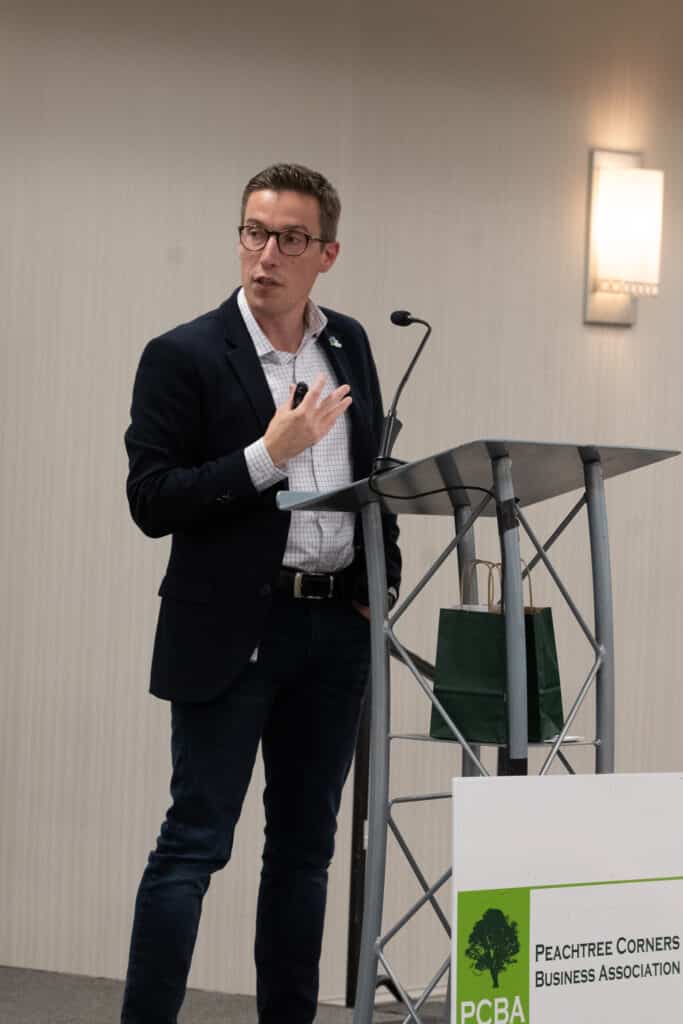
“That speaks to the importance of ensuring that we have a great community,” he said. “So at Partnership Gwinnett we work with all of our cities, and the county government as well, [on] a kind of a best-practices trip.”
He added that the peer tour allows everyone to know what the neighboring communities are doing and share the good news.
“We will take all of these elected officials, but also city staff, to different cities across the Southeast,” he said. “Last year, I believe they went to Huntsville, and have been to Greenville, Chattanooga — all cities that have done some really cool redevelopments that have taken their city to the next level. Our goal is to learn from them.”
Related
Business
Two Peachtree Corners Business Leaders Named Finalists for EY Entrepreneur Award
Published
3 weeks agoon
April 23, 2025
Ernst & Young’s Entrepreneur Of The Year celebrates ambitious entrepreneurs who are shaping the future
Ernst & Young LLP (EY US) recently announced the finalists for the prestigious Entrepreneur Of The Year 2025 Southeast Award, and two local, Peachtree Corners business leaders — David Quirk, president and CEO of DLB Associates Consulting Engineers PC and Erin Hanson, founder and CEO of Guardian Sports — made the list.
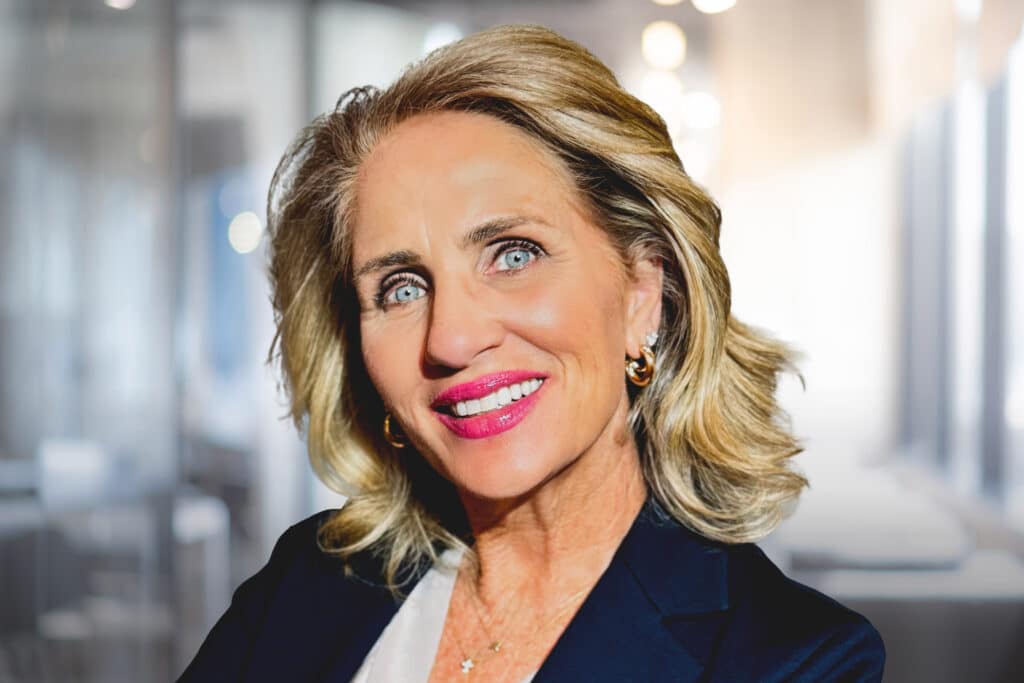
Hanson’s Guardian Sports is a family-owned company dedicated to serving athletes through safety and performance improvements in sports equipment. Major products include the Guardian Cap, PEARL ball and Guardian Infill serving the sports industry.
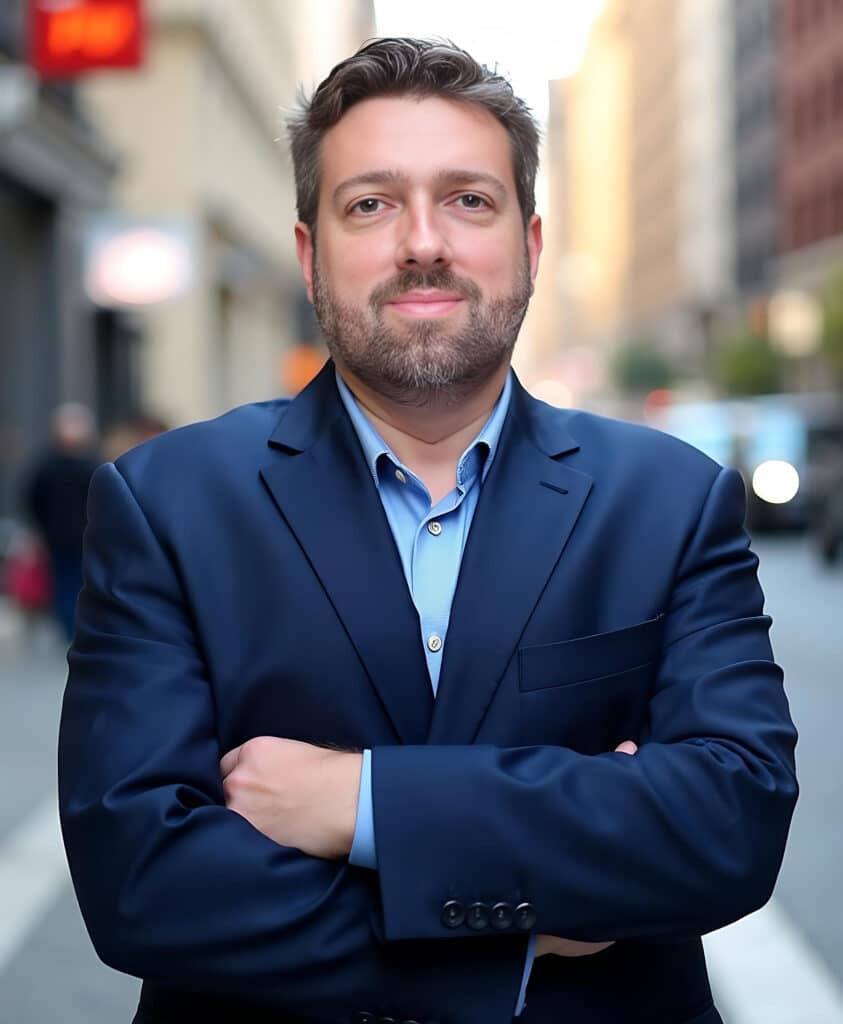
DLB Associates is a U.S.-based consulting engineering firm specializing in mission-critical and complex built environments. With more than 40 years of expertise, DLB delivers innovative, technology-driven solutions in engineering, commissioning and operations worldwide.
Celebrating entrepreneurial leaders
Now in its 40th year, Entrepreneur Of The Year recognizes the bold leaders who disrupt markets through the world’s most ground-breaking companies, revolutionizing industries and making a profound impact on communities. The program honors those entrepreneurs whose innovations shape the future and pave the way for a thriving economy and a hopeful tomorrow.
The Southeast program celebrates entrepreneurs from Alabama, Georgia, North Carolina, South Carolina and Tennessee.
An independent panel of judges selected 36 finalists for their entrepreneurial spirit, purpose, growth and lasting impact in building long-term value.
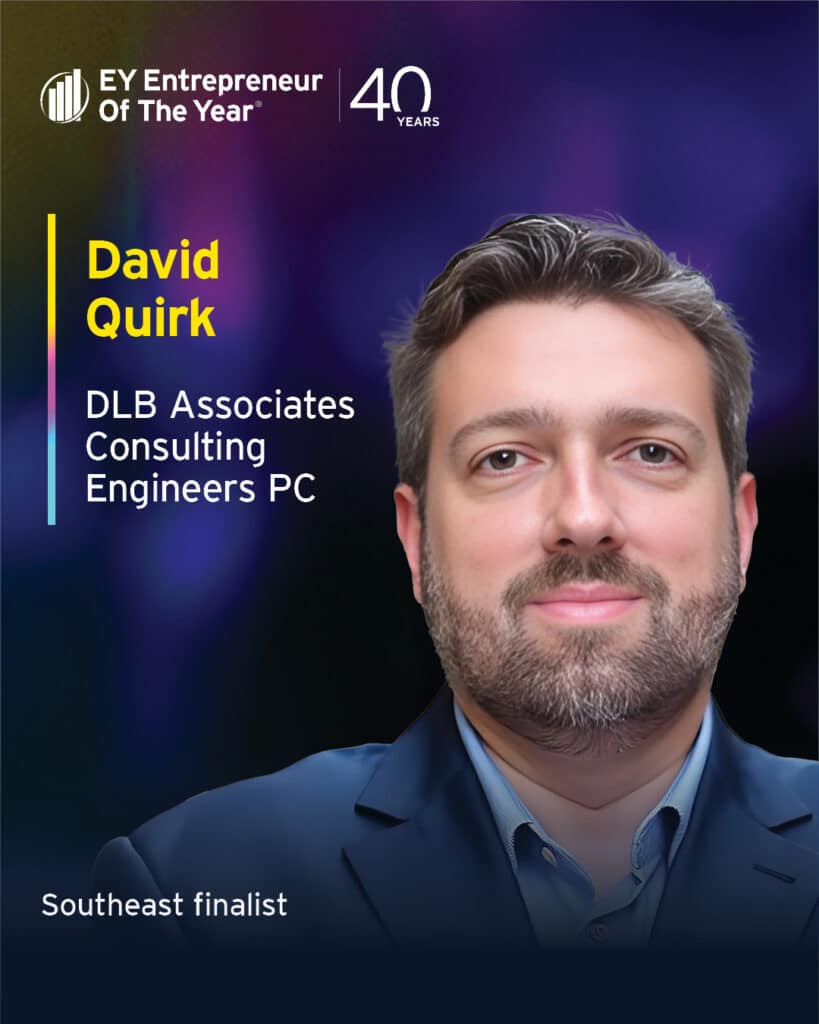
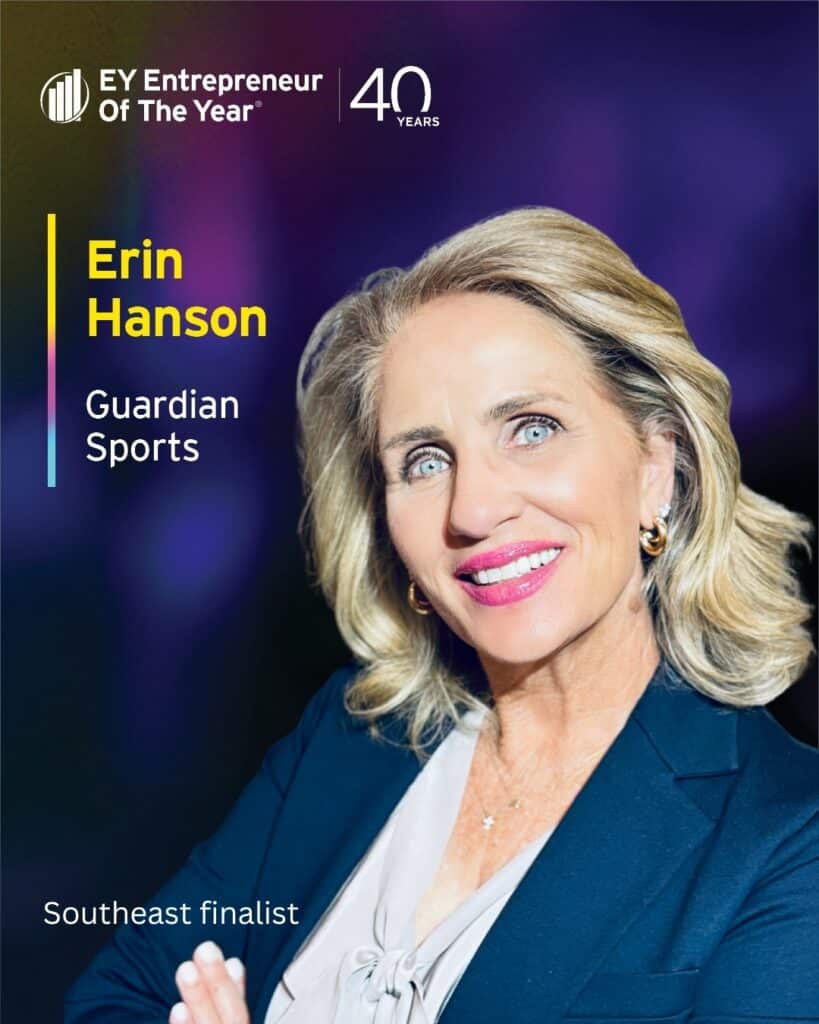
“This year’s finalists are leading examples of innovation, perseverance and resilience, illuminating paths to a brighter future for their industries and communities,” said Chevy Arnold, Entrepreneur Of The Year Southeast Program co-director.
“Their commitment to excellence transforms challenges into opportunities, inspiring us all,” added Kimberly Kicklighter, Entrepreneur Of The Year Southeast Program co-director.
Entrepreneur Of The Year honors many different types of business leaders for their ingenuity, courage and entrepreneurial spirit.
The program showcases original founders who bootstrapped their business from inception or who raised outside capital to grow their company; transformational CEOs who infused innovation into an existing organization to catapult its trajectory; and multigenerational family business leaders who reimagined a legacy business model to strengthen it for the future.
Including Quirk and Hanson, the 2025 Southeast finalists are:
- Marc Hodulich | 29029 | Atlanta, Georgia
- Damon Stafford | Alpine Intel | Charlotte, North Carolina
- Lou Hensley | Aspida | Durham, North Carolina
- Matthew Dent | Buffalo Rock Company | Birmingham, Alabama
- Melanie Little | Colonial Pipeline Company | Alpharetta, Georgia
- Will Bartholomew | D1 Training | Franklin, Tennessee
- Rene Diaz | Diaz Foods | Atlanta, Georgia
- David Quirk | DLB Associates Consulting Engineers PC | Peachtree Corners, Georgia
- Markus Scott | EyeQ Monitoring | Atlanta, Georgia
- Jon Gosier | FilmHedge | Atlanta, Georgia
- John Fitzpatrick | Force Marketing | Atlanta, Georgia
- Dr. Barry Patel | Galt Companies | Atlanta, Georgia
- Dr. Wade Smith | Galt Companies | Atlanta, Georgia
- Charles Gillespie | Gambling.com Group | Charlotte, North Carolina
- Kevin McCrystle | Gambling.com Group | Charlotte, North Carolina
- Mike Griffin | Griffin Brothers Companies | Cornelius, North Carolina
- Erin Hanson | Guardian Sports | Peachtree Corners, Georgia
- Dan Beem | Hissho Sushi | Charlotte, North Carolina
- Aaron Siegel | Home Team BBQ | Charleston, South Carolina
- Marc Murphy | Ignite Digital Services | Charleston, South Carolina
- Miller Chalk | Inglett & Stubbs, LLC | Mableton, Georgia
- Liza Rodewald | Instant Teams | Southern Pines, North Carolina
- Stephen Andresen | McClancy Foods & Flavors | Fort Mill, South Carolina
- Travis LeFever | Mission Mobile Medical Group | Greensboro, North Carolina
- Cyrus Mojdehi | Northway Homes | Charlotte, North Carolina
- Connor Ryan | NutraSky | Alpharetta, Georgia
- Fritz Owens | OTR Solutions | Roswell, Georgia
- Christopher Chuang | Relay, Inc. | Raleigh, North Carolina
- Kurt Jacobus | restor3d, Inc. | Durham, North Carolina
- Tom Kendrot | Shearwater Health | Nashville, Tennessee
- Teak Shore | Southern Lighting Source | Cumberland, Georgia
- Cindy Eckert | Sprout Pharmaceuticals | Raleigh, North Carolina
- Bryan Moore | TalkShopLive Inc. | Nashville, Tennessee
- Tina Moore | TalkShopLive Inc. | Nashville, Tennessee
- Igor Marinelli | Tractian | Atlanta, Georgia
- Joan Butters | Xsolis | Franklin, Tennessee
You can learn more about the finalists at ey.com/en_us/entrepreneur-of-the-year-us/southeast/winners-finalists.
Regional award winners will be announced on June 25 during a special celebration. The winners will then be considered by the national independent panel of judges for the Entrepreneur Of The Year National Awards, which will be presented in November at the annual Strategic Growth Forum®, one of the nation’s most prestigious gatherings of high-growth, market-leading companies.
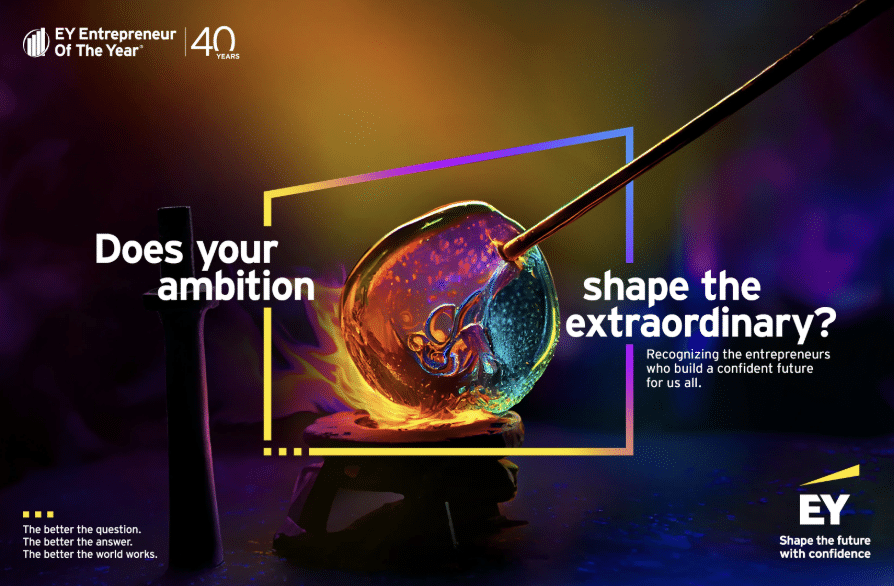
About Entrepreneur Of The Year
Founded in 1986, Entrepreneur Of The Year has celebrated more than 11,000 ambitious visionaries who are leading successful, dynamic businesses in the U.S., and it has since expanded to nearly 60 countries globally.
The U.S. program consists of 17 regional programs whose panels of independent judges select the regional award winners every June. Those winners compete for national recognition at the Strategic Growth Forum® in November where national finalists and award winners are announced.
The overall national winner represents the U.S. at the EY World Entrepreneur Of The Year™ competition.
For more about the award, visit ey.com/us/eoy.
Related
Business
SCB Construction Group Partners with CGA Reps on New Peachtree Corners HQ
Published
4 weeks agoon
April 15, 2025
SCB Construction Group, freshly rebranded from SteelCo, secures construction project with CGA Reps for new office HQ in Peachtree Corners
SCB Construction Group has announced a strategic partnership with CGA Reps to build a new office headquarters in Peachtree Corners. The project, encompassing approximately 26,000 square feet of innovative workspace, marks a significant milestone in advancing CGA Reps’ corporate vision while showcasing SBA Construction Group’s commitment to delivering transformative construction solutions.
In collaboration with Oakley Real Estate Partners — serving as developers of the project on behalf of CGA Reps — this venture reflects a united effort to bring cutting-edge design (from Smallwood architecture firm) and operational excellence to the commercial kitchen equipment industry.
The announcement follows several high-profile projects for SCB Construction Group in 2024, including a 72,500-square-foot manufacturing center and headquarters for Process Equipment & Controls, an impressive interior build-out for Courtesy Ford Conyers’ commercial service center and the Phase 1 completion for StoreEase Loganville — recently honored as a 2024 Smart Facility of the Year by Modern Storage Media.
A bold new chapter for CGA Reps
The new 25,890-square-foot headquarters is designed to be more than just a workplace — it is envisioned as an inspiring environment that serves both client engagements and employee creativity. CGA Reps is recognized as an industry expert in commercial kitchen equipment, representing leading manufacturers, warehousing, distributing and installing everything from fryers to commercial walk-in freezers.
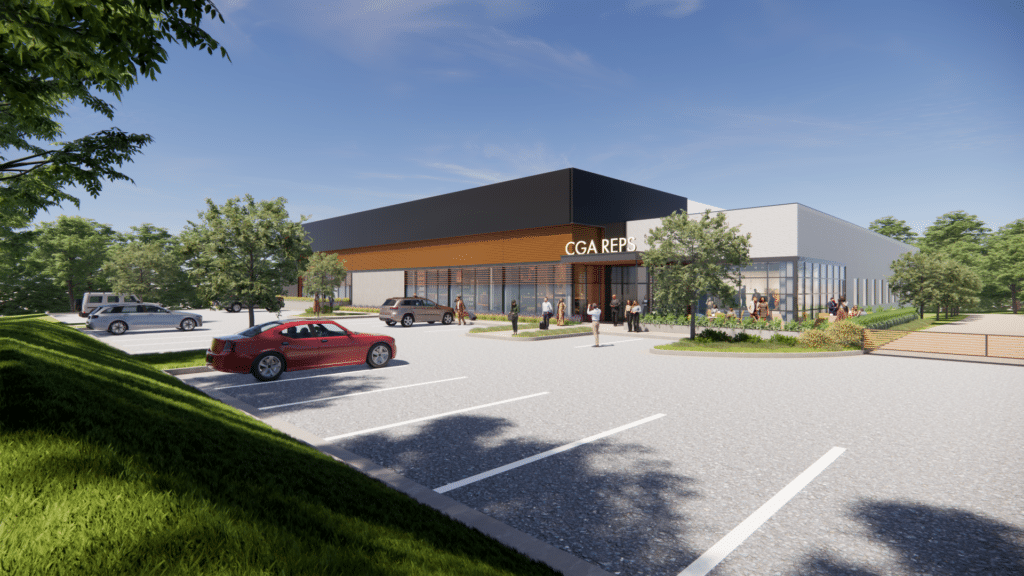
The facility’s design reflects this expertise, featuring a dedicated approximately 9,000-square-foot showroom kitchen that will host equipment demonstrations, tradeshows and webinars. This dynamic space will allow CGA Reps to showcase its comprehensive product range and provide clients with hands-on experiences of the latest commercial kitchen innovations.
A standout feature of the project is its innovative approach to stormwater management. With the site comprising only three acres, sufficient space for a traditional detention pond does not exist. To overcome this challenge, the design includes an underground detention system located beneath the truck court to efficiently handle all stormwater runoff.
This solution not only maximizes the use of the available land but also reinforces CGA Reps’ commitment to sustainable practices.
“We are excited to embark on this project with CGA Reps,” said Jay Bailey, CEO of SCB Construction Group. “This partnership underscores our commitment to customer excellence in design and construction, and it is a testament to the trust our clients place in our ability to deliver projects that not only meet but exceed expectations.”
Delivering excellence through proven expertise
SCB Construction Group’s track record in 2024 has been nothing short of remarkable. Earlier in the year, the company completed a 72,500 square foot manufacturing center for Process Equipment & Controls, integrating office space within a dynamic production facility.
This project was celebrated for its innovative design that balanced operational efficiency with a modern aesthetic, utilizing IMP panels to mimic tilt-up concrete, setting new standards for manufacturing environments.
Similarly, the interior build-out for Courtesy Ford Conyers’ commercial service center demonstrated SCB Construction Group’s ability to transform conventional spaces into functional and attractive environments that cater to both customer and staff needs.
The company’s commitment to quality and precision was again evident in the successful Phase 1 completion for StoreEase Loganville. This project, which recently earned the distinction of a 2024 Smart Facility of the Year by Modern Storage Media, highlights SCB Construction Group’s forward-thinking approach to construction and design, incorporating smart technologies and design that enhance sustainability and operational efficiency.
A rebranding that reflects a vision for the future
In a move that signals its evolution and growth, SCB Construction Group has recently rebranded from its former identity, SteelCo Buildings, as it spins off its construction division. This strategic rebranding is not merely cosmetic — it represents a renewed commitment to capabilities, credibility and client-focused service.
The refreshed brand is anchored by a new tagline “Deep Expertise, High Expectations” and a clear brand promise that communicates the company’s mission: to craft exceptional construction experiences based on precision, innovation and trust.
“Our rebranding is about more than just a new name or logo; it’s a renewed promise to our clients and communities,” explained Robert Lee, marketing director at SCB Construction Group. “We believe that our updated brand identity, including our invigorated tagline and mission statement, encapsulates our dedication to pushing the boundaries of design and construction. It reflects our commitment to creating spaces that are as inspiring as they are functional.”
Transforming spaces to inspire and connect
The new headquarters for CGA Reps is expected to become a landmark facility in Peachtree Corners. Beyond its impressive architectural design and advanced construction techniques, the building is planned as a hub for innovation and collaboration.
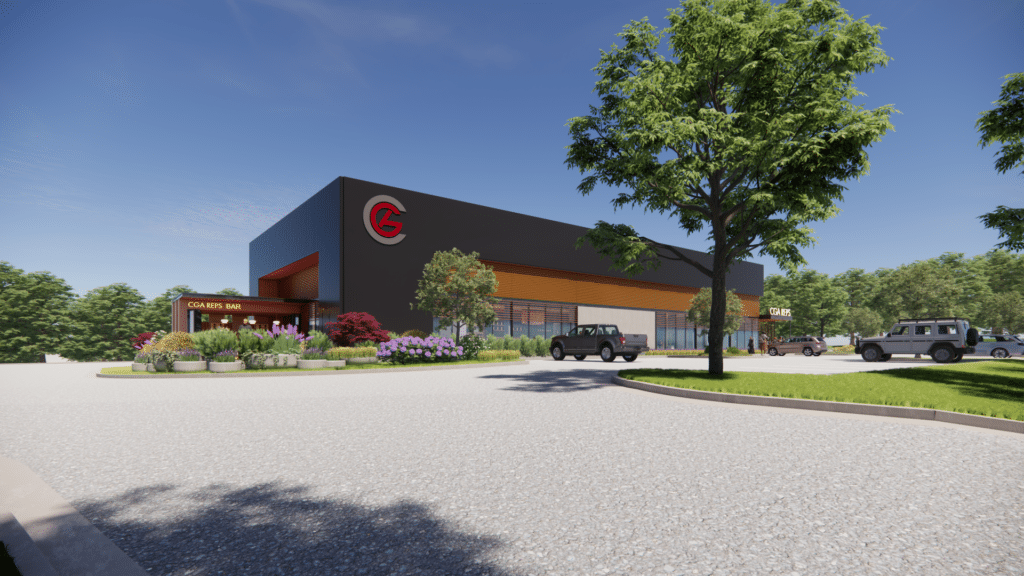
The interior build-out will include dynamic client reception areas, interactive meeting rooms, and dedicated spaces designed to foster creativity and teamwork among employees. The layout is crafted to ensure that every area of the facility contributes to a productive and inspiring work environment.
“By investing in this state-of-the-art facility, CGA Reps is making a strong statement about the future of work,” said Bryan Young, VP of construction at SCB Construction Group. “Our team is dedicated to designing and building spaces that not only serve the immediate needs of our clients but also create environments that motivate and inspire. The new headquarters will be a testament to that vision.”
Looking ahead
The partnership between SCB Construction Group and CGA Reps marks a significant step forward for both companies. As SCB Construction Group continues to build on its legacy of excellence and innovation, this project is poised to set a new benchmark for modern office headquarters design in the region.
With a strategic focus on creating spaces that inspire, connect and drive success, the future looks promising for both SCB Construction Group and its esteemed partner, CGA Reps.
For more information on the new headquarters project or to learn more about SCB Construction Group’s portfolio, visit scbcg.com.
Related
Read the Digital Edition
Subscribe
Keep Up With Peachtree Corners News
Join our mailing list to receive the latest news and updates from our team.
You have Successfully Subscribed!

Katherine Lafourcade — A Journey of Passion, Resilience and Giving Back

GA Tech Launches First-of-its-Kind GT Atrium in Peachtree Corners

Digital Edition

PCBA Announces 2025 Scholarship Winner

Official City Merchandise Line Debuts This Saturday at Town Green

Paul Duke STEM High School Student Earns CGO Scholarship

World Blood Donor Day Starts Here: Theo’s Miracle, Katherine’s Mission [Podcast]

Executive Function: A Tribute to Working Moms

City of Peachtree Corners Awarded Certificate of Achievement From GFOA for Seventh Straight Year

Simpson Elementary Marks Exceptional Children’s Week

Executive Function: A Tribute to Working Moms

Official City Merchandise Line Debuts This Saturday at Town Green

Peachtree Corners Grows Business Opportunities Through Economic Development

Digital Edition

World Blood Donor Day Starts Here: Theo’s Miracle, Katherine’s Mission [Podcast]

Paul Duke STEM High School Student Earns CGO Scholarship

Light up the Corners [Video]

Capitalist Sage: Business Leadership in Your Community [Podcast]

Cliff Bramble: A Culinary Adventure through Italy

Top 10 Brunch Places in Gwinnett County

A Hunger for Hospitality

THE CORNERS EPISODE 3 – BLAXICAN PART 1

Top 10 Indoor Things To Do This Winter

The ED Hour: What it takes to Remove Barriers from Education

Peachtree Corners Life
Topics and Categories
Trending
-
City of Peachtree Corners5 days ago
Official City Merchandise Line Debuts This Saturday at Town Green
-
Community4 days ago
Executive Function: A Tribute to Working Moms
-
Business5 days ago
Peachtree Corners Grows Business Opportunities Through Economic Development
-
Community4 days ago
Simpson Elementary Marks Exceptional Children’s Week





